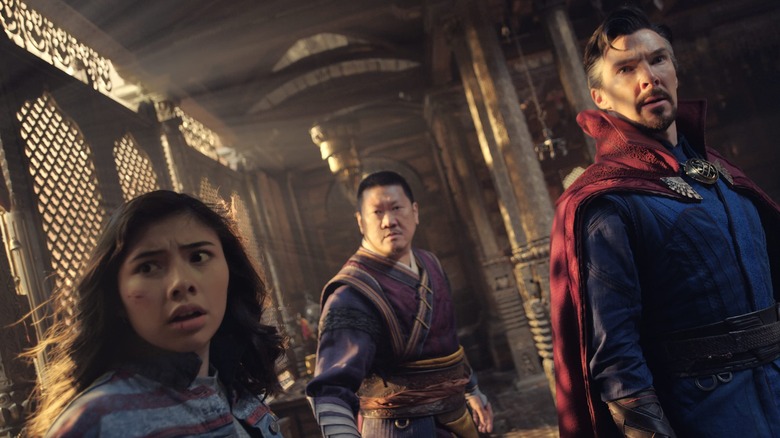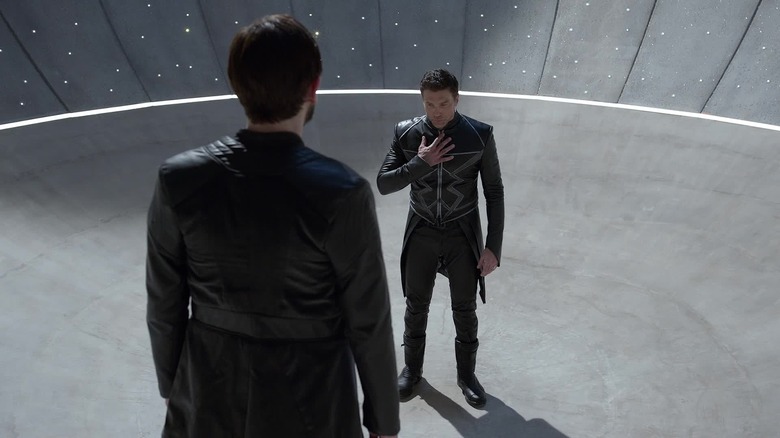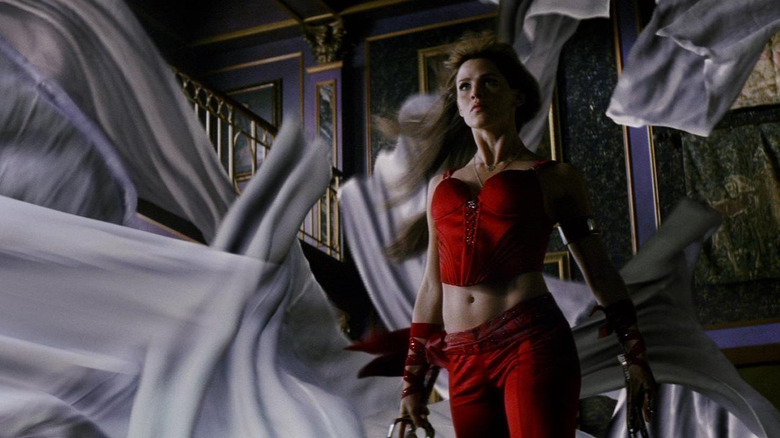The Worst Marvel Shows And Movies Are Now Canon Thanks To Doctor Strange
It's been apparent for quite some time that in the aftermath of "Avengers: Endgame" the multiverse was going to be the next big thing in the Marvel Cinematic Universe. Even though it didn't truly reveal itself in "Spider-Man: Far From Home," a movie released mere months after "Endgame," the seeds were planted there. Now, between "WandaVision," "Loki," "Spider-Man: No Way Home," and, most importantly, "Doctor Strange in the Multiverse of Madness," there is no turning back. Phase 4 of the MCU is all about the multiverse, and that means so much is about to change.
With director Sam Raimi's "Multiverse of Madness" now in theaters, we have much a better idea, in practice, of just how much is going to be possible within the larger Marvel multiverse, and what that means for audiences in the coming years. One of the biggest things we need to accept? Just about everything ever made with the Marvel brand attached to it counts, from the best of the best and yes, even the worst of the worst.
Warning: spoilers ahead for "Doctor Strange in the Multiverse of Madness." Proceed with caution.
Inhumans is now canon thanks to the multiverse
Ever since "Iron Man" hit theaters in 2008, virtually everything that followed up through 2019's "Endgame" took place in one universe, dubbed Earth-616 in "Multiverse of Madness." But as we have come to learn, the multiverse is seemingly endless, with thousands upon thousands of various realities existing within that larger framework. What Marvel Studios has opted to do with this storytelling tool is to retroactively say that various TV shows and movies are now technically canon within the MCU — they just exist elsewhere within the multiverse. Or the characters we've met elsewhere have variants in other universes that look suspiciously like the actors who had previously played the roles.
This allows for Patrick Stewart to reprise his role as Charles Xavier in the film during the Illuminati scene. But what is perhaps most surprising is that it also paved the way for Anson Mount to return as Black Bolt, a role he first played in ABC's gloriously failed "Inhumans" TV show that first aired in 2017. This is a show that seemingly nobody liked, as it currently boasts an abysmal 11% approval rating on Rotten Tomatoes. Marvel originally planned to make a movie out of the characters but those plans changed and, as the evidence in front of us suggests, not for the better. This is widely viewed as one of the worst productions of any kind to have the Marvel brand attached to it in the MCU era. And yet, "Inhumans" is now, at least in some way, canon within the biggest franchise on the planet.
What's most staggering about this is that Marvel Studios is now sort of reclaiming the past – the good, the bad, and the ugly of it all. They didn't have to make this version of Black Bolt canon but, at the same time, they killed him in a pretty brutal fashion on screen in the film to perhaps suggest that the past is dead. Long live the future! "Inhumans" deserved better and maybe this was all a way of suggesting that. Regardless, bringing this poorly regarded show into the MCU in any way is a bit of a shock.
Are these things technically canon now too?
The inclusion of "Inhumans" within the larger framework of the multiverse opens up a host of other questions. "Doctor Strange in the Multiverse of Madness" doesn't actually do all that much exploring of the multiverse. We get glimpses of some universes but the bulk of the film is spent between Earth-616 and Earth-838, where the Illuminati were mercilessly killed by Scarlet Witch. Within the film, we understand that certain things, on some level, were explicitly retrofitted as part of the greater MCU canon. But the implication is that a great many other things from the past are technically canon as well.
So, what exactly is implied here? Reading between the lines, if "Inhumans" is on the table, everything is on the table. There may come a time when 2005's "Elektra" starring Jennifer Garner becomes canon within the Marvel multiverse, a movie that was a spin-off of Ben Affleck's not terribly well-liked "Daredevil" movie. To that end, perhaps Affleck's Matt Murdock exists in the multiverse as a different version of Charlie Cox's take on the character who exists on Earth-616, as established in "No Way Home." Why stop there? Maybe the short-lived "Blade: The Series" exists in the multiverse, a one-season show that aired after the "Blade" movie trilogy wrapped up that pretty much everyone has forgotten about.
We can go on and on but the implication of what we see in "Multiverse of Madness" is that nothing is ever erased. No amount of rebooting can undo what came before. It all counts in some way, even if we never actually see it on screen again. It's a convenient storytelling device to capitalize on nostalgia but one that can certainly devolve into groan-worthy territory if Kevin Feige and Co. take it too far with the cameo stuff. Whether or not that's how this unfolds remains to be seen.
From a filmmaking standpoint, it's easy to see why this is appealing. Everything counts when it is convenient for it to count. Black Bolt made sense for the Illuminati? Great! They kind of had a version of that character waiting in the wings. If there is not enough nostalgia or storytelling reason to bring something such as "Runaways" into the fold? Then it can simply be ignored. That's the key. It's canon when it's convenient.
"Doctor Strange in the Multiverse of Madness" is in theaters now.


